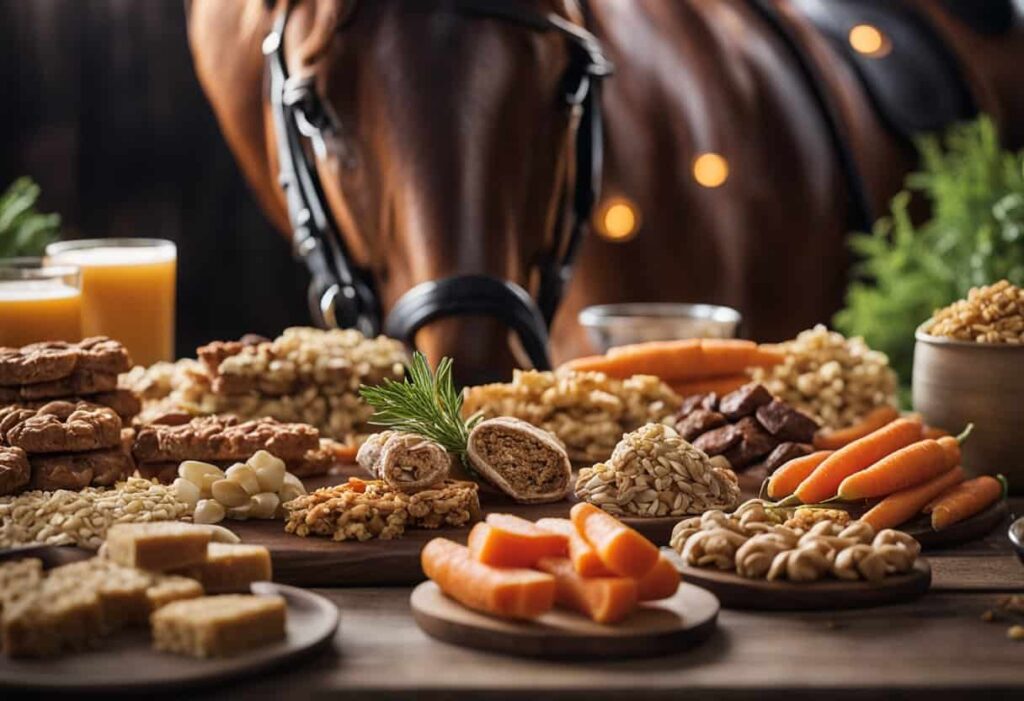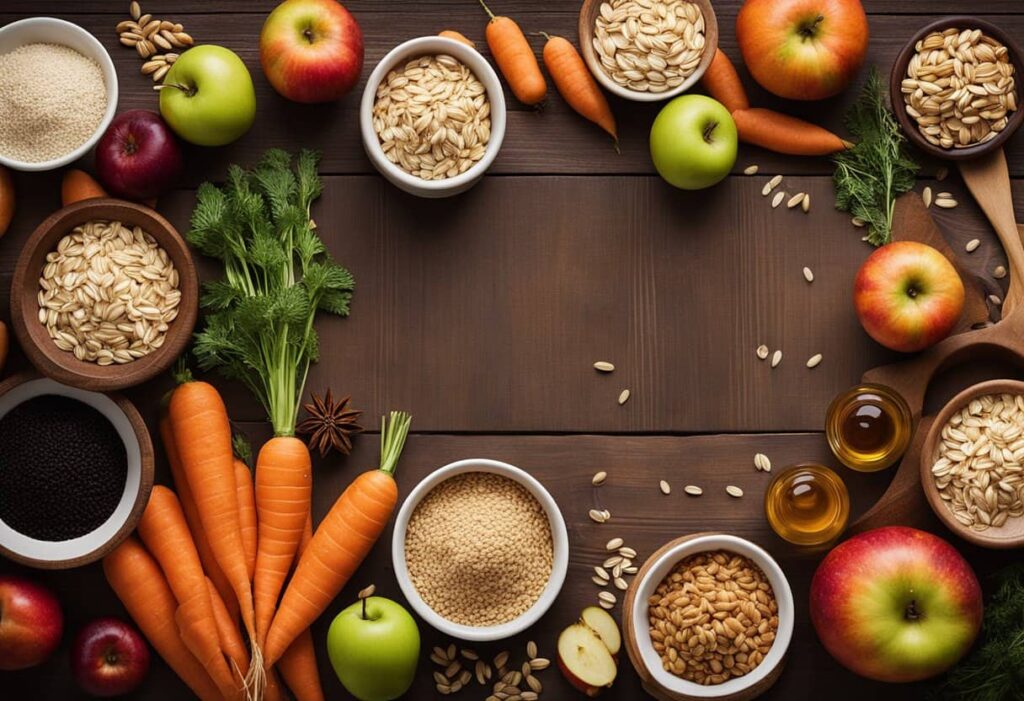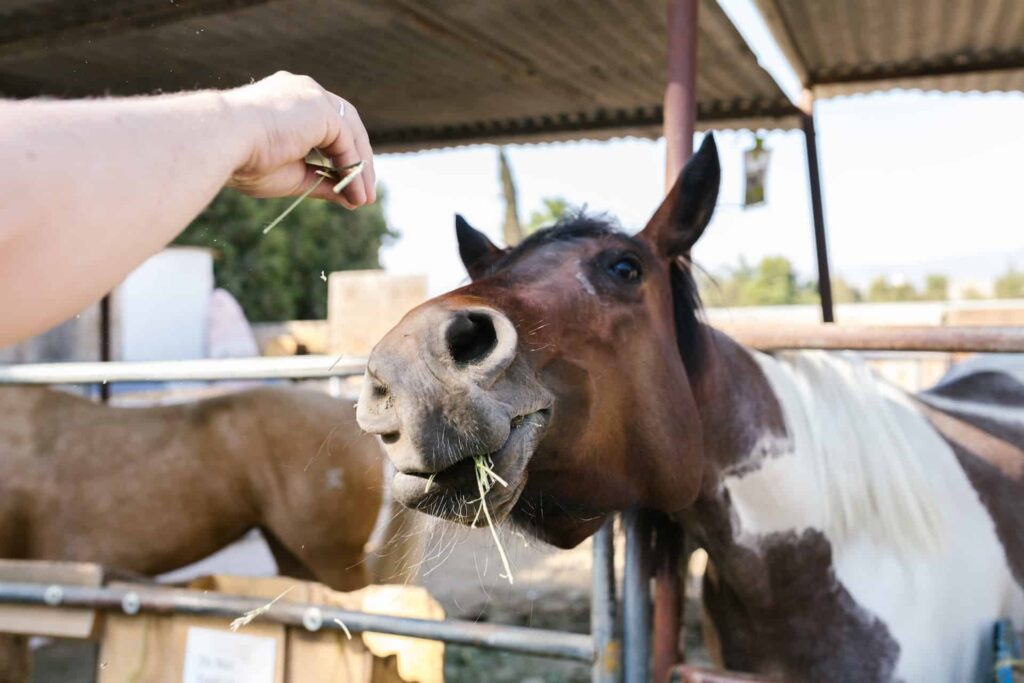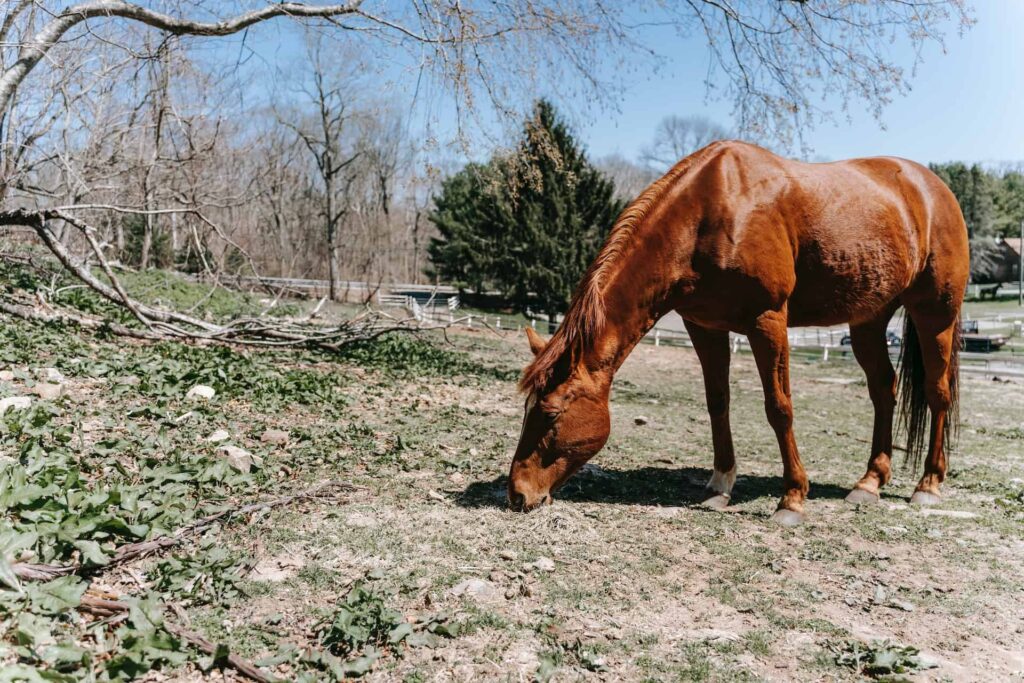Horse owners and trainers often use treats as a way to reward or encourage horses during training sessions or simply to show affection. Just like with humans, treats for horses should be tasty, appealing, and nutritious. It’s important to understand the nutritional needs of horses and to find treats that can complement their diet without causing any health issues.
Various healthy ingredients can be used for horse treats, including fruits, vegetables, seeds, and grains. These ingredients can be found in commercial horse treats or can be used to make homemade treats. However, it’s essential to be cautious with the types and quantities of treats given to horses, as some ingredients may be toxic or lead to overfeeding.
Key Takeaways
- Horse treats should be tasty, appealing, and nutritious while complementing their diet
- Treats can be homemade or store-bought, using a variety of healthy ingredients
- Ensure the treat is safe and non-toxic, while avoiding overfeeding
Understanding Horse Nutrition
Role of Treats in Equine Diet
Horses are natural herbivores and their diet mainly consists of hay and grass. They require an adequate balance of vitamins, minerals, and fiber to maintain a healthy digestive system. Treats can be a fun way to provide variety and essential nutrients to their diet. However, it is important to remember that treats should not compromise the primary components of a horse’s diet.
Some good treat options for horses include fruits and vegetables like apples, carrots, and watermelon. These can provide necessary vitamins as well as being enjoyable for the horse. In addition, specially formulated horse treats with added nutrients and flavors, such as garlic, can be found at many equine supply stores.
Herbivore Digestive System
Horses have a unique digestive system, specifically designed for their herbivorous nature. Their digestive tract is divided into two main sections: the foregut and the hindgut. The foregut consists of the mouth, esophagus, stomach, and small intestine, while the hindgut includes the cecum, colon, and rectum.
| Part of Digestive System | Function |
|---|---|
| Mouth | Chewing and breaking down plant material |
| Esophagus | Transporting food to the stomach |
| Stomach | Mixing and initial breakdown of food |
| Small intestine | Nutrient absorption |
| Cecum | Fermentation of fibrous materials |
| Colon | Absorption of water and electrolytes |
| Rectum | Expulsion of waste |
An essential part of the horse’s diet is roughage or fiber, usually derived from hay and grass. Fiber helps maintain the balance of bacteria in the cecum and promotes healthy gut function. It also assists in the prevention of digestive issues such as colic and ulcers. Thus, while treats should be included occasionally, it is crucial to prioritize hay and grass consumption for a horse’s overall digestive health.
Healthy Ingredients for Horse Treats
Beneficial Fruits and Vegetables
When it comes to feeding your horse some tasty and healthy treats, fruits and vegetables are often an ideal choice. Some popular and nutritious options include carrots and apples, which can be given sparingly as they are high in sugar and should not replace the horse’s main diet. Other fruits, like bananas and strawberries, as well as berries, are also safe for horses to consume, as they provide important vitamins and minerals.
For horses that prefer vegetables, options like celery and sweet potatoes can be great choices. These veggies are not only easy to digest but also provide hydration and essential nutrients.
Grains and Fiber Sources
Horses benefit from consuming grains and fiber sources, which help keep their digestive systems functioning optimally. One popular ingredient in horse treats is oats, a whole grain that provides energy and is easily digestible. When feeding oats, be sure to monitor your horse’s overall caloric intake to prevent weight gain or dietary imbalances.
Flaxseed is another wholesome ingredient to consider adding to horse treats. Rich in omega-3 fatty acids, flaxseed supports healthy skin and coat, making it a great addition to your horse’s diet.
Incorporating water in treats, like soaking oat-based treats, can help increase your horse’s overall water intake, especially during warmer weather. However, be mindful of the water content as too much moisture can lead to mold and spoilage.
Ingredients like peanut butter, pumpkin, and coconut oil are also safe for horses to consume, but be cautious about the amounts you feed. These ingredients can be high in fat and sugar, so moderation is key to maintaining a balanced diet.
Remember that your horse’s main source of nutrition should always come from forage, with treats serving as occasional supplements. With a variety of healthy fruits, vegetables, grains, and other ingredients, you can provide your horse with tasty and nutritious treats they’ll love.
Homemade Horse Treats

Simple Horse Treat Recipes
One way to ensure a healthy treat for your horse is by making homemade horse treats. These treats can be made using all-natural ingredients and no added sugar. The following are some simple horse treat recipes that you can try.
Recipe 1: Molasses and Applesauce Treats
- 2 cups oat flour
- 1/2 cup molasses
- 1 cup applesauce
- 1 teaspoon baking powder
- Preheat oven to 350°F (175°C).
- In a large mixing bowl, combine the oat flour, molasses, applesauce, and baking powder. Mix well until a dough forms.
- On a lightly floured surface, roll out the dough to about 1/4-inch thickness.
- Cut into desired shapes using a cookie cutter or a knife.
- Place the treats on a lined baking sheet and bake for 15-20 minutes or until golden brown. Let them cool before serving to your horse.
These homemade treats are a great option because the molasses add sweetness without the need for refined sugar, and the applesauce provides a natural fruit flavor.
Recipe 2: No-Added-Sugar Oat Treats
- 3 cups oat flour
- 1 cup unsweetened applesauce
- 1/4 cup water
- 1/2 teaspoon cinnamon
- Preheat oven to 350°F (175°C).
- In a large bowl, mix the oat flour, unsweetened applesauce, water, and cinnamon.
- Form the dough into small balls, about the size of a golf ball.
- Place the balls on a lined baking sheet and flatten them slightly with the back of a spoon.
- Bake for 15-20 minutes, or until the edges are golden brown. Allow the treats to cool before serving.
By making these homemade horse treats, you can control the ingredients and ensure your horse is getting a healthy, tasty treat that they will enjoy. Be sure to store the treats in an airtight container in a cool, dry place for up to one week. You can also freeze them if you’d like to keep them longer.
Safe Treats and Toxic Substances
When it comes to providing treats for horses, it’s important to be knowledgeable about which ingredients are safe and which can be harmful. In this section, we’ll discuss ingredients to avoid, as well as choking hazards and safety precautions.
Ingredients to Avoid
Some ingredients can be toxic or poisonous to horses. It is essential to be mindful of these substances when selecting treats for your equine friends. Some of the dangerous ingredients to avoid include:
- Chocolate: This popular treat contains a compound called theobromine, which is toxic to horses and can cause serious health issues.
- Raisins and grapes: These fruits can cause kidney damage in horses and should be avoided.
- Tomatoes: As members of the nightshade family, tomatoes can be harmful to horses, causing gastrointestinal upset and other issues.
Additionally, it’s essential to keep an eye out for mycotoxins in horse treats, as these toxic compounds can lead to significant health risks.
Choking Hazards and Safety Precautions
When feeding horses treats, it’s crucial to reduce any choking risks to ensure their safety. Here are some guidelines to follow:
- Size: Treats should be appropriately sized for the horse’s mouth to minimize the choking hazard. Large treats should be broken into smaller, more manageable pieces.
- Texture: Horses should be able to chew treats easily. Hard treats with sharp edges increase the risk of choking and should be avoided.
- Supervision: It’s a good idea to monitor your horse while they enjoy their treats to ensure that they are safe and not experiencing any choking issues.
By being aware of the potential risks for horses and paying strict attention to ingredients, horse owners can provide their equine companions with delicious and safe treats, free from hazardous substances and choking concerns.
Commercial Horse Treat Options
Reading Labels for Quality Treats
When purchasing commercial horse treats, it’s essential to read labels carefully to ensure they are made from high-quality ingredients that are safe and nutritious for your horse. Some key aspects to consider include:
- Ingredients: Look for natural and wholesome ingredients, such as oats, alfalfa, and molasses, which provide a balanced blend of nutrients.
- Additives: Avoid treats with artificial colors, preservatives, or flavors.
- Nutrient contents: Check the label for the levels of protein, fat, and fiber to ensure the treats are suitable for your horse’s specific needs.
Benefits of Commercial Treats
Commercial horse treats offer several advantages over homemade or improvised options. Some benefits include:
- Convenience: Pre-packaged treats are easy to store and transport, making them a great option to encourage desired behaviors during training or simply show your horse some love.
- Variety: Commercial treats are available in a wide range of flavors and types to cater to the preferences of individual horses. Common options include sweet feed and treats formulated with joint support and dietary supplements.
- Consistency: With commercial treats, you can expect consistent quality, taste, and nutritional value in every serving. This can be especially beneficial when selecting the best treats for horses with specific dietary needs or health concerns.
When selecting commercial horse treats, consider your horse’s preferences, nutritional needs, and the intended purpose of the treat. Whether it’s a special reward for training success or a way to support their overall health, commercial treats can be an excellent addition to your horse’s diet.

Feeding Treats Responsibly
Moderation and Horse Behavior
Horse owners need to practice moderation when giving treats to their horses. Overfeeding sweet treats can lead to undesirable behaviors and even health issues. Horses are known to become pushy or nippy when they expect a treat, which can affect their interaction with humans.
One way to ensure moderation is to limit the amount and type of treats given. Horses can enjoy a variety of treats such as apples, carrots, and even small amounts of commercial horse treats. Horse owners should avoid feeding excessive amounts of sweet treats, as this can lead to obesity and associated health problems.
Treats should never replace a horse’s regular feed or be used as the main source of nutrition. This allows horses to maintain a well-balanced diet necessary for their overall health.
Feeding Techniques to Prevent Problems
When feeding treats, it is crucial to use techniques that minimize the risk of injury and unwanted behaviors. One common issue is horses inadvertently biting their fingers while attempting to take a treat. This can be addressed by using the following technique:
- Hold the treat flat in the palm of your hand.
- Keep fingers away from the treat by extending them straight out.
- Offer the treat to the horse, which should prevent the horse from accidentally biting your fingers.
Another technique to prevent problems during treat feeding is to train the horse to take treats gently. This can be done by rewarding calm and polite behavior during treat feeding, such as slowly taking the treat without rushing or biting.
To maintain a healthy relationship between the horse and the owner, it is necessary to establish boundaries and communicate expectations during treat feeding. For example, horse owners can teach their horses to only take treats when permitted, ensuring that the horse does not become pushy or resort to nipping at pockets for treats. This is beneficial in creating a respectful and safe interaction between the horse and the owner.
In conclusion, feeding treats to horses can be a fun and rewarding experience for both the horse and the owner. However, it must be done responsibly with proper techniques and moderation to ensure the safety and well-being of both the horse and the owner.
Frequently Asked Questions
What types of food can be given to horses as special rewards?
Horses enjoy a variety of fruits and vegetables as occasional treats. Some popular options include apples, carrots, pears, and watermelon. However, it is essential to remove any seeds or large pits before feeding them to your horse. You can also purchase specially formulated horse treats from feed stores and pet supply shops.
Which kinds of treats are suitable for horse training sessions?
For training sessions, look for treats that are small, bite-sized, and easy for the horse to chew and swallow quickly. This helps to maintain the horse’s focus on the training exercise. Some horse-safe training treats include small carrot or apple pieces, hay cubes, and commercial horse treats specifically designed for training purposes.
How can I ensure the treats I give my horse are healthy?
To ensure your horse’s treats are healthy, opt for natural and low-sugar options. Avoid feeding large quantities and examine ingredient labels for added sugars, artificial additives, and preservatives. It’s also crucial to prevent overfeeding treats, as excess treats can lead to weight gain and other health issues.
Are peppermint treats safe and beneficial for horses?
Peppermint treats can be safe and enjoyable for horses in moderation. Many equines find the taste of peppermint to be appealing, and, as a bonus, they can help ease indigestion and gas in some cases. However, it is essential to provide peppermint treats in moderation, as too much sugar can be harmful to your horse’s health.
What options are available for horses with dental issues requiring soft treats?
For horses with dental issues that require soft treats, alternatives include softer fruits like bananas and berries, soaked hay cubes, and specially designed soft horse treats available in the market. Make sure to consult your veterinarian before introducing any new treats to your horse’s diet.
What is a homemade treat recipe considered safe and enjoyable for horses?
A simple and safe homemade treat recipe for horses is:
- 2 cups of oats
- 1 cup of shredded carrots or apples
- ½ cup of molasses or honey (use sparingly)
- ½ cup of water or applesauce
Preheat your oven to 350°F (175°C). Mix all the ingredients in a bowl and form small balls or cookie shapes. Place the treats on a baking sheet lined with parchment paper and bake for about 20 minutes or until golden brown. Cool completely before offering them to your horse. Remember to provide these treats in moderation, as they still contain sugars.
Last Updated on December 14, 2023 by Nate Dewsbury



